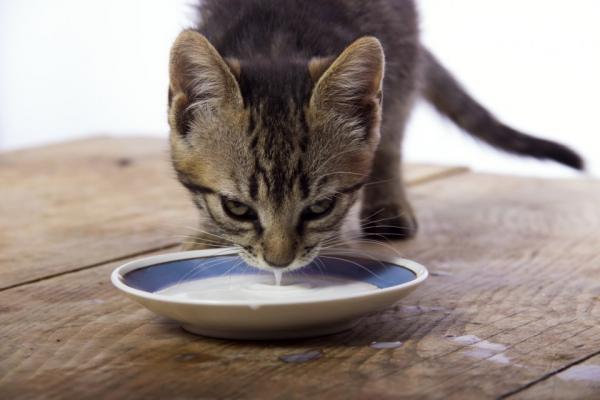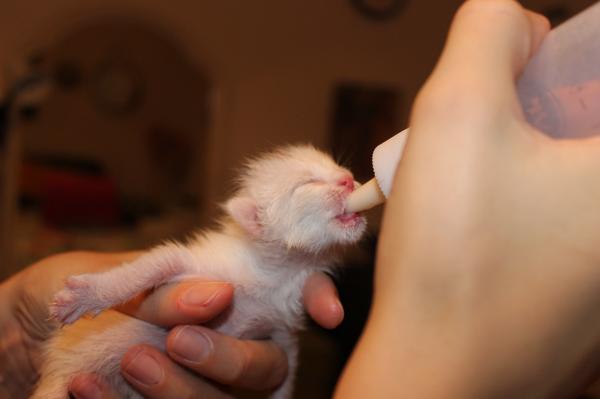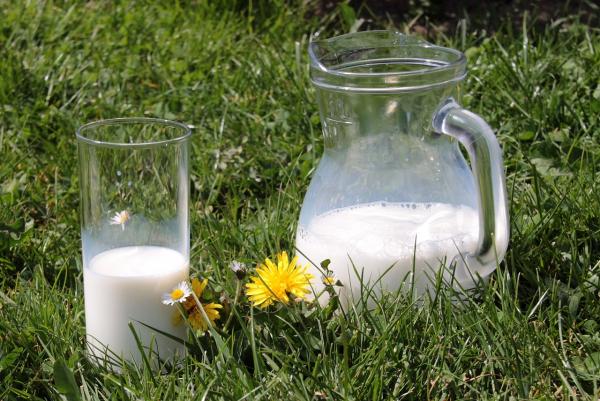Can cats drink milk?

Can cats drink cow’s milk? Is it good for them or, on the contrary, is it harmful? Without a doubt, these are some of the first questions that assail us when we decide to adopt a cat no matter how old you are. And, how many times have we seen on television or on the big screen beautiful felines enjoying a good bowl of milk? Well, in this article we will talk about the digestive system of the animal, we will detail those cases in which it is possible to offer this food, how to do it and which type is more suitable. Can cats drink milk? Keep reading and discover the answer!
Milk and cats
Before indicating whether milk is good for cats or not, it is essential to talk about your digestive system and how the cat digests this food. As with humans, the digestive tract is constantly changing, modifying the production of certain enzymes depending on the food that is followed, the amount of protein that is ingested, fats, sugars, etc. In this way, it is logical that these changes are also subject to the different stages of growth. In this sense, during the lactation period infants produce a large amount of the enzyme lactase, responsible for digesting the lactose that makes up the milk. As weaning progresses and milk intake is reduced, the puppy’s digestive tract also decreases lactase production, reaching in some cases to develop lactose intolerance.
This same process can also happen in humans, which is why the percentage of lactose intolerant is so high. However, as noted, not all cats are affected so dramatically the production of the enzyme and, therefore, some of them have the ability to tolerate milk during adulthood. Especially those felines that continue to drink cow’s milk after weaning, tend to continue generating lactase. However, even if they have the ability to digest lactose correctly, it should be noted that milk should not occupy the entire diet of the cat, later we will detail how to offer this food correctly. As the puppy grows, it is crucial to adapt its diet to introduce new nutrients, proteins, vitamins, etc., necessary for its proper development.
On the other hand, although the lactase enzyme production decreases, if the feline continues to generate a small amount it is possible that it can tolerate milk, too, in small quantities. Likewise, dairy products such as cheese and yogurt, by having a lower amount of lactose, can also be digestible by the animal in moderate quantities.
So, can small cats drink milk?
If with small cats we refer to newborn puppies, the ideal is to be fed by breast milk. If, unfortunately, you are in the care of a kitten that has been orphaned, we do not recommend giving cow’s milk because the composition is different from breast milk and, therefore, the animal would not be receiving the nutrients, lipids and proteins it needs. Currently we can have preparations that simulate the mother’s milk, so for these cases we recommend going to the veterinarian to indicate the best according to the age of the child. Also, do not miss our article on “How to feed a newborn kitten?”.
Now, if the cat in question is still a puppy but has already been weaned, we can offer small amounts of milk to see if your body digests it correctly. If it does not present any problem, we can say that the small cat can drink milk from time to time, always as a complement and never as a main ingredient.

And adult cats, can they drink cow’s milk?
As we have seen previously, most cats tend to progressively reduce lactase production after weaning. This means that, due to the deficiency of the enzyme or the complete disappearance of it, many of them can develop lactose intolerance. Why it happens? Very easy. It is known as lactose to the sugar that makes up the milk, consisting of glucose and galactose. To digest it, the body produces naturally in the small intestine the enzyme lactase, which is responsible for breaking it down to transform it into simple sugars and, therefore, facilitate its absorption. When the enzyme can not fulfill its function, the lactose passes to the large intestine without being digested, and is fermented at this point in charge of the bacterial flora, developing a whole series of digestive problems. In this way, the symptoms of lactose intolerance in cats They are as follows:
- Nausea and vomiting
- Diarrhea
- Gases
- Swelling of the abdominal area
So, if after offering cow’s milk to your adult cat you observe these symptoms, with all probability it will be an intolerance and, therefore, you will have to eliminate the lactose from your diet. On the other hand, there is allergy to lactose, a pathology completely different from the previous one. While intolerance affects the digestive system, the allergy involves the immune system, since this system develops a hypersensitivity and emits an allergic reaction when it perceives that the allergen in question has penetrated the organism. In this case, the allergen would be lactose, and the allergy would produce the following symptoms in the feline:
- Itching accompanied by hives
- Difficulty breathing
- Tos
- Vomiting
- Diarrhea
- Decrease in blood pressure
- Stomach pain that can be translated into sudden meows
If your cat suffers any of these reactions, do not hesitate and go to the vet immediately, especially if you notice that it does not breathe properly.
Finally, it is possible that the animal does not develop any of the cases above and, therefore, be able to correctly digest lactose. In these cases, we can say that cats can drink cow’s milk without problems, always controlling the quantities and as a complement. For this, we recommend providing a little milk and observe the animal to see if you can really take it from time to time or, on the contrary, it should be completely eliminated from your diet. In the end, the most important thing is always to know our cat to understand him and learn to offer him the best for him and his health.
How to give milk to a cat
As we have seen throughout the previous sections, if it seems that the cat does not suffer from any intolerance or allergy to lactose, we can offer a little milk. In general, it is most advisable to provide skimmed or semi-skimmed milk, although some cats tolerate whole milk without any difficulty. Therefore, we encourage you to try and observe your furry companion to see how he reacts and discover what kind of milk he likes and feels better.
On the other hand, if your cat has shown signs of intolerance but would like to know if your cat can drink milk anyway, you should know that the best option is milk without lactose, both for these cases and for the animals that do tolerate it. As with humans, milk without lactose is easier to digest and, therefore, prevents the appearance of problems related to the digestive tract.
Regarding the amount of milk recommended for cats, the truth is that we can not establish a certain number of milliliters because, as we have seen, everything will depend on each case and the degree of tolerance of the animal. What we can assure you is that, regardless of whether you have the ability to digest lactose or not, It is not recommended to abuse your consumption. An excess of milk in the diet can be translated a too high percentage of calcium, fact that can get to cause the development of kidney stones, for example. In this way, we recommend establishing a guideline based on the needs of our cat and offer milk twice a week, in small bowls. Of course, we emphasize, the measures and doses can vary as long as it does not harm the animal’s health.

And the products derived from milk?
As we have commented in previous sections, if there is no allergy or lactose intolerance, the cat can consume dairy products such as cheese or yogurt without problems. Of course, as with all processed foods, we should always keep in mind the quantities. In this sense, and although they are good for the animal, it is not advised to abuse their consumption, being ideal to offer a couple of spoonfuls of yogurt during breakfast, for example, or a piece of cheese as a reward. Of course, the yogurt must be natural and sugar-free, and the cheese is recommended to be soft and creamy. Likewise, you can alternate the consumption of milk without lactose with the intake of this type of dairy products to avoid offering both foods on the same day.
In fact, yogurt in particular is a highly beneficial food for cats because of its high content in probiotics. In this sense, another product recommended for the same reason is kefir, which has an even higher percentage and helps the animal to regulate the intestinal flora, as well as the digestive system in general. Of course, we repeat, we do not recommend passing the two weekly doses, since these products should always act as a complement.
If you want to read more articles similar to Can cats drink milk?, we recommend that you enter in our section of Homemade Diets.


